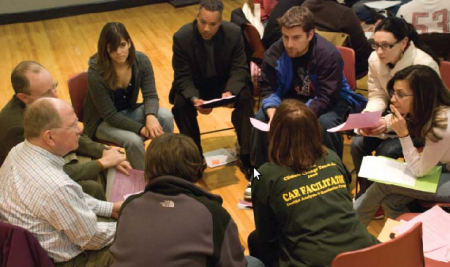ICAR Facilitates Climate Change Discussion at Fairfax Teach-In
ICAR Facilitates Climate Change Discussion at Fairfax Teach-In
 On January 29, the Conflict Analysis and Resolution (CAR) undergraduate program participated in the Climate Change Teach-In at Mason's Fairfax Campus. The event featured Mason professors, researchers and notable environmental speakers, such as Lester Brown, president of the Earth Policy Institute and author of Plan B 2.0: Rescuing a Planet Under Stress and a Civilization in Trouble. The CAR portion of the teach-in offered participants a conflict perspective on climate change as well as an opportunity to talk about the complexities of climate change in a facilitated discussion setting. Sandy Ruckstuhl, ICAR Ph.D. candidate, and Dr. Susan F. Hirsch, CAR Program Director, opened by highlighting the physical effects and social consequences of climate change. Examples illustrated the potential for aggravation of existing global conflicts and various strategies for addressing climate change from the conflict analysis and resolution perspective. After this introduction, approximately 200 students, faculty and staff formed 20 discussion groups to consider topics that included personal and community responsibility, policy changes, social justice and ethical considerations, and the options, costs, and risks of climate change.
On January 29, the Conflict Analysis and Resolution (CAR) undergraduate program participated in the Climate Change Teach-In at Mason's Fairfax Campus. The event featured Mason professors, researchers and notable environmental speakers, such as Lester Brown, president of the Earth Policy Institute and author of Plan B 2.0: Rescuing a Planet Under Stress and a Civilization in Trouble. The CAR portion of the teach-in offered participants a conflict perspective on climate change as well as an opportunity to talk about the complexities of climate change in a facilitated discussion setting. Sandy Ruckstuhl, ICAR Ph.D. candidate, and Dr. Susan F. Hirsch, CAR Program Director, opened by highlighting the physical effects and social consequences of climate change. Examples illustrated the potential for aggravation of existing global conflicts and various strategies for addressing climate change from the conflict analysis and resolution perspective. After this introduction, approximately 200 students, faculty and staff formed 20 discussion groups to consider topics that included personal and community responsibility, policy changes, social justice and ethical considerations, and the options, costs, and risks of climate change.
Most groups were facilitated by CAR students, with a team of ICAR Ph.D. and M.S. students, led by Lisa Shaw, assisting the process. The event gave CAR and ICAR students an opportunity to practice the skills taught in methods and practice courses. and was a great opportunity for students and faculty to work together collaboratively.
At the end, ICAR's Monica Jakobsen, Leila Patterson, Stacy Stryjewski, Mara Schoeny, Paul Snodgrass and Mery Rodriguez debriefed the audience, summarizing the key issues emerging from the group discussions. The groups reached conclusions that reaffirmed the need for change within personal attitudes and the need for education. Participants also stressed the importance of influencing public policy at the local, state and national levels, as well as encouraging Mason administrators, faculty, staff, and students to create a "green" campus.
The CAR-facilitated discussions brought a fresh and creative approach to dealing with a current and polemic issue, an approach that included everyone in the conversation about the problem and demonstrated the power of our own agency.




